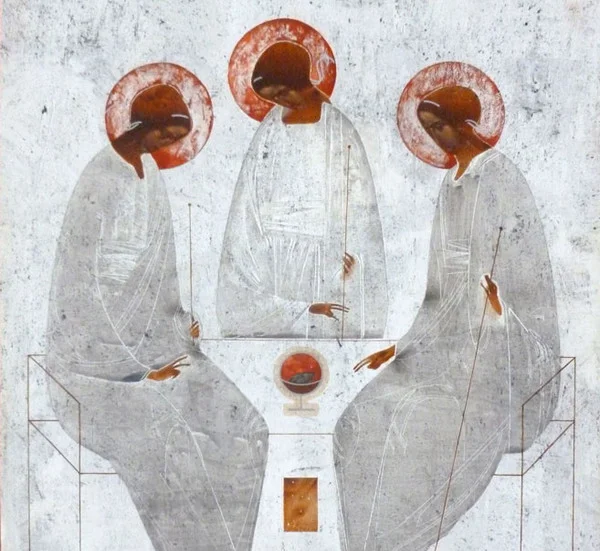The Trinity: The Basis of Christian Life
In preparation for Trinity Sunday this week, Fr Peter offers a reflection on the Trinity.
Ivanka Demchuk. The Holy Trinity.
It is an experience almost all students are forced to endure at one time or another. Picture the scene. A group of friends gathers together, perhaps on a summer evening. Work is finished for the day, the sun is not long down, the wine is flowing. Idle chit chat puts the world to rights and all is as it should be. Except that two of the group are paying no attention to anybody else. You see, two of the group—as they will eagerly tell anyone prepared to listen—are very much in love, indeed have been very much in love for all of eight days—a practically matrimonial commitment in their eyes. And their time is spent not contributing, not participating but variously gazing into one another’s eyes, holding as much of the other’s hand as they can physically contain, and mostly, to put it bluntly, snogging.
It is no less a theologian than Rowan Williams who asks us to consider this kind of love, and try to map it on to the relationship between the Father and the Son. It will not work. The love of God is not entirely self absorbed. The love of God is gratuitous, overflowing, it exceeds itself. Father and Son do not enjoy a relationship which is closed, in which they attend to nothing and no-one but each other. Instead their love has an openness, an outpouring which St Augustine famously identified with the third person of the Trinity, with that which we call the Holy Spirit. In so doing, Augustine did not mean, as is often suggested, that Father and Son are rather like human persons, and that the Spirit is the abstract concept of love which flows between them. He meant that there are different ways in which scripture requires us to talk about God—as the source of all existence, as the divine presence which disrupts our tidy world of power at a particular time and in a particular place, and as the effect, the working out, the living out of that creativity and that presence in the world and in the lives of human beings such as you and I.
What follows from this is that everything which we do as Christians is done in the Spirit. The Trinity is, far from being the abstract concern of theological metaphysics, actually the basis of the entire Christian life. So far example, as I read scripture I do so seeking the God who sustains my existence in love, who himself seeks and sustains his people, and I am enabled to meet this God in the person of Jesus Christ precisely because the Spirit gives life to that scriptural encounter—without Father, Son, and Spirit, the Bible is simply another book. As I offer my prayers I do so knowing that the Father who loves his children sees not them in their sin but his son in their likeness, and so united with Christ I am able to pray, except that it is not I who prays but the Spirit who prays within me. The initiative here is grace itself: the love of the Father, in offering his Son in our likeness; the love of the Son in giving himself freely to the Father as our representative; the overflowing love of the Spirit which allows this relationship between Father and Son to spill out into the lives of every created thing. We mirror this life of prayer when we come together as a Eucharistic community. When we celebrate this great sacrament we offer ourselves to the Father, or rather, we allow the Son to offer himself instead of ourselves, to the Father, but that allowing – that participation in the life of Father and Son and their perfect loving relationship – is nothing other than the life of the Spirit.
Genuine love, divine love, is genuinely gratuitous. It is not simply selfless, in that it gives itself entirely to another; it is also endless, in that it cannot be exhausted by any single object of love, even an object as infinitely loveable as the person of Jesus Christ. When we struggle with the world in which we find ourselves, with the decisions, the relationships, the problems which make up our own little parts of that world, we are nonetheless living the life of the Spirit if we try, if only we try, to be loving. An act of love is an act of God, and the true act of God, the true act of love, is something which our own failures and weaknesses and selfishness can never diminish, however much they may knock us back, however determined we are to wallow in our own inadequacy. Divine love is not packaged up, a possession shared by Father and Son but kept to themselves and given to no-one else. It is an eternal act of self-giving which cannot end because the Spirit is always at work bringing life, bringing love, to every creature and person under heaven. The doctrine of the Trinity is the teaching that in the life of God himself there is something which overflows all attempts to contain it, there is an invitation for you and for me, a reminder that giving and sharing can be one and the same.





